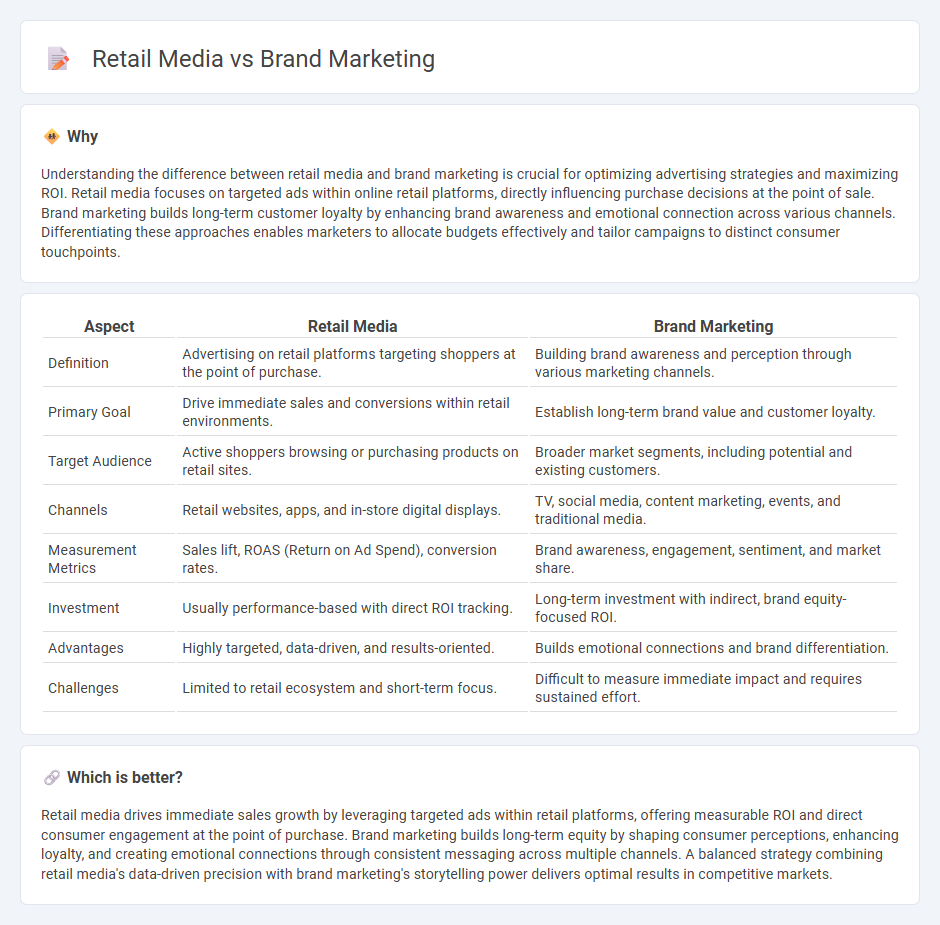
Retail media focuses on targeted advertising within retail platforms, leveraging shopper data to drive immediate sales and improve return on ad spend (ROAS). Brand marketing emphasizes building long-term brand equity, customer loyalty, and perception through broad, consistent messaging across multiple channels. Explore the differences and benefits of each approach to optimize your marketing strategy.
Why it is important
Understanding the difference between retail media and brand marketing is crucial for optimizing advertising strategies and maximizing ROI. Retail media focuses on targeted ads within online retail platforms, directly influencing purchase decisions at the point of sale. Brand marketing builds long-term customer loyalty by enhancing brand awareness and emotional connection across various channels. Differentiating these approaches enables marketers to allocate budgets effectively and tailor campaigns to distinct consumer touchpoints.
Comparison Table
| Aspect | Retail Media | Brand Marketing |
|---|---|---|
| Definition | Advertising on retail platforms targeting shoppers at the point of purchase. | Building brand awareness and perception through various marketing channels. |
| Primary Goal | Drive immediate sales and conversions within retail environments. | Establish long-term brand value and customer loyalty. |
| Target Audience | Active shoppers browsing or purchasing products on retail sites. | Broader market segments, including potential and existing customers. |
| Channels | Retail websites, apps, and in-store digital displays. | TV, social media, content marketing, events, and traditional media. |
| Measurement Metrics | Sales lift, ROAS (Return on Ad Spend), conversion rates. | Brand awareness, engagement, sentiment, and market share. |
| Investment | Usually performance-based with direct ROI tracking. | Long-term investment with indirect, brand equity-focused ROI. |
| Advantages | Highly targeted, data-driven, and results-oriented. | Builds emotional connections and brand differentiation. |
| Challenges | Limited to retail ecosystem and short-term focus. | Difficult to measure immediate impact and requires sustained effort. |
Which is better?
Retail media drives immediate sales growth by leveraging targeted ads within retail platforms, offering measurable ROI and direct consumer engagement at the point of purchase. Brand marketing builds long-term equity by shaping consumer perceptions, enhancing loyalty, and creating emotional connections through consistent messaging across multiple channels. A balanced strategy combining retail media's data-driven precision with brand marketing's storytelling power delivers optimal results in competitive markets.
Connection
Retail media leverages data-driven advertising on retailer platforms to target consumers at the point of purchase, directly influencing brand marketing effectiveness. By integrating brand marketing strategies with retail media, companies can enhance product visibility and drive higher conversion rates through personalized messaging. This synergy increases return on ad spend (ROAS) and strengthens overall customer engagement within the retail ecosystem.
Key Terms
**Brand Marketing:**
Brand marketing drives long-term customer loyalty through consistent messaging, emotional engagement, and value proposition development across multiple channels. It builds brand equity by shaping perception and trust, leveraging storytelling, advertising campaigns, and strategic positioning to differentiate in competitive markets. Discover more about how brand marketing influences consumer behavior and business growth.
Brand Equity
Brand marketing focuses on building and enhancing brand equity by creating strong emotional connections and long-term trust with consumers through consistent messaging and storytelling. Retail media leverages point-of-sale data and targeted advertising within retail environments to drive immediate sales and improve product visibility. Explore how integrating brand marketing with retail media can amplify brand equity while boosting sales performance.
Brand Positioning
Brand marketing strategically builds and maintains a distinctive brand identity to influence consumer perception and foster long-term loyalty. Retail media leverages targeted advertising within retail environments to drive immediate sales and enhance product visibility. Explore in-depth how brand positioning plays a critical role in balancing these approaches effectively.
Source and External Links
What is brand marketing? - Funnel - Brand marketing is the strategy of creating an emotional connection and a unique identity for a company that goes beyond products, influencing how customers perceive and engage with the brand through elements like logos, storytelling, and customer experience to build long-term trust and loyalty.
What Is Brand Marketing? | VistaPrint US - Brand marketing promotes a business by building a strong, recognizable identity focused on fostering recognition, trust, and emotional connection with customers through consistent storytelling that highlights a brand's values and identity beyond individual products.
What is Brand Marketing? Definition and examples - Amazon Ads - Brand marketing establishes and nurtures relationships between a brand and consumers by promoting the brand as a whole rather than individual products, leveraging brand attributes like name, colors, and emotional qualities to build brand value and consumer loyalty.
 dowidth.com
dowidth.com